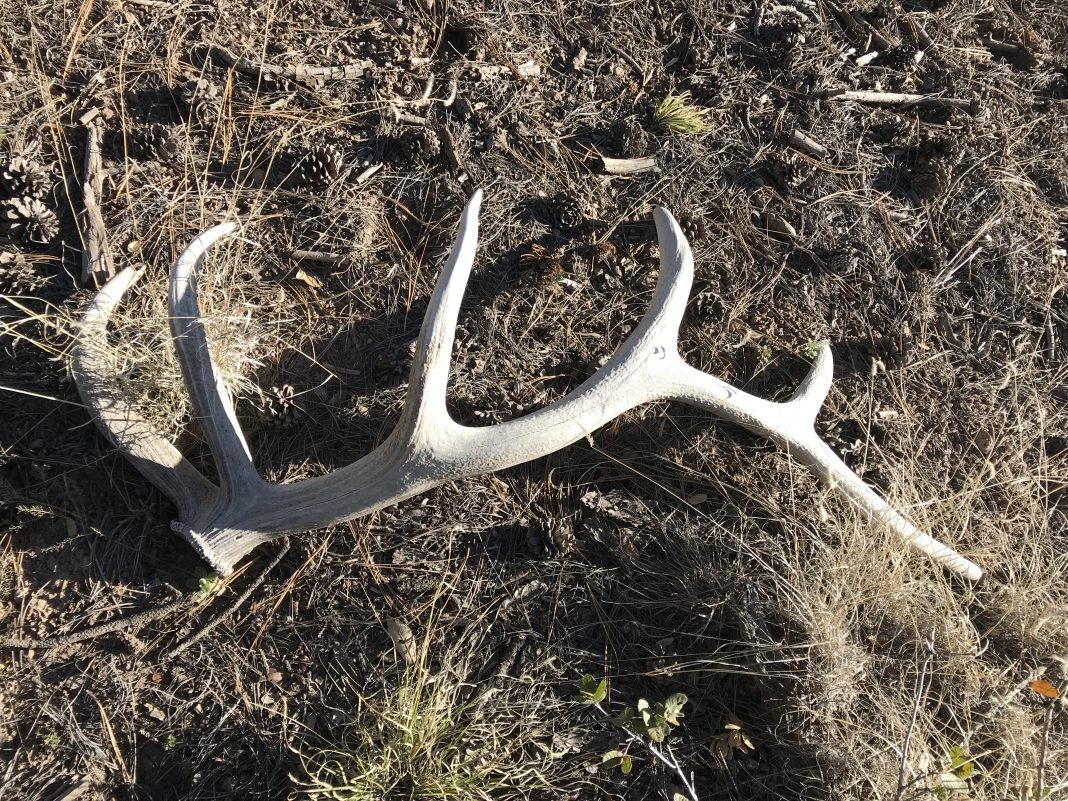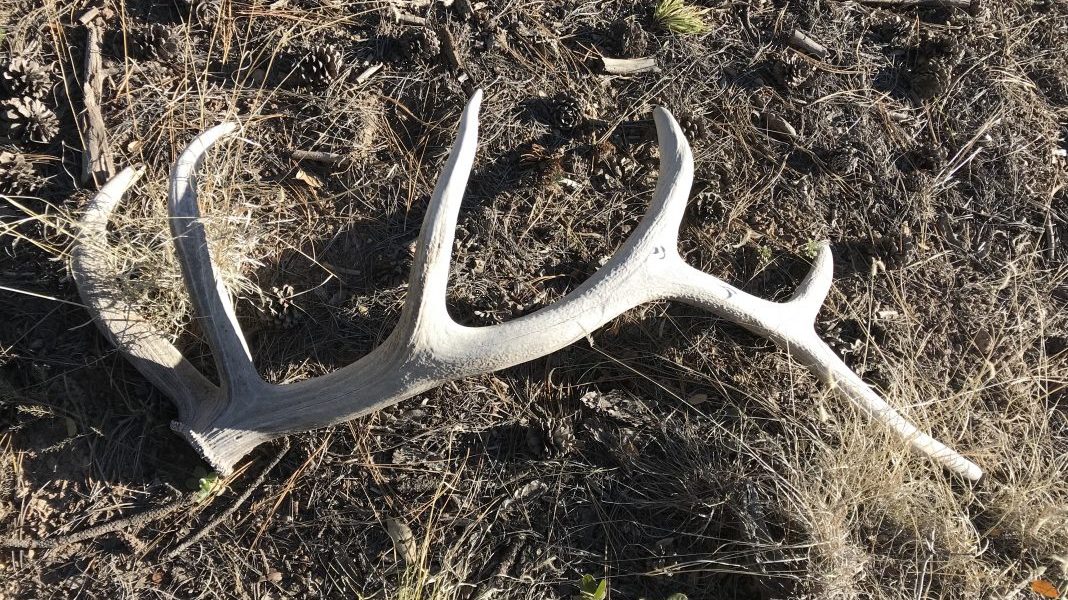
By Mike Koshmrl, WyoFile.com
CHEYENNE—A major shift lies ahead in how the state of Wyoming regulates shed-antler hunting, until now a free outdoor pursuit available to anyone on public land.
Fourteen years ago, Wyoming was ahead of the curve when legislators made a big change to state law, banning shed-antler hunting on public lands west of the Continental during the depths of winter.
The single-sentence statute made clear the purpose of that rule change: “minimizing harassment or disturbance of big game populations.”
Fast forward to the present, and two more antler-related bills are headed to Gov. Mark Gordon’s desk for a signature. This time, however, the reform’s intent is different: regulating the experience of shed hunters.
“It’s not just about protecting wintering wildlife,” Wyoming Game and Fish Department Director Brian Nesvik told WyoFile. “Instead, it’s that many people around the state that engage in that activity have said, ‘Hey, we’ve got too many people [doing this] and we’ve got to regulate this.’”
The complementary bills poised to become law make several major changes.
House Bill 123 – Collection of antler or horns by residents and nonresidents directs the Wyoming Game and Fish Department to give Wyoming residents a one-week head start over nonresidents — up from the three days of lead time initially proposed in the legislation.
House Bill 276 – Shed antlers and horns conservation stamp, meanwhile, makes public land shed hunting a de facto licensed activity, at least for non-residents. The final engrossed version of the legislation declares that shed antlers and horns on state and public lands are the property of Wyoming, just like the wildlife that dropped them. The bill requires nonresidents to possess a conservation stamp — a $21.50 expense — to legally partake in public land shed hunting. Residents and kids under 15 are exempted.
The new regulations go well beyond other western states’ shed-hunting rules. Seasonal closures and restrictions aren’t unusual in places like Montana, and states like Nevada and Utah require proof of shed-hunting education. But no states have regulated the inanimate objects quite like Wyoming is about to. The reform targets a pastime that’s grown in popularity and been transformed by commercial and recreational shed hunters who travel around the West to comb the landscape each spring. Disgruntled locals who’ve soured on an experience they once treasured helped spur the changes.
Freshmen lawmakers Rep. Ryan Berger (R-Evanston) and Rep. Cody Wylie (R-Rock Springs), HB 276’s primary sponsor, successfully pushed the shed hunting reforms through the statehouse.
“This started for me when I was a kid living in Jackson,” said Berger, HB 123’s primary sponsor. “As a young scout, going out and enjoying an outing with my troop, my father and going out on the [National Elk] Refuge and collecting sheds.”
The May 1 opener, he said, “wasn’t a rush” back then.
But easy-going spring days are long gone when it comes to antler hunting on the outskirts of the Elk Refuge. The May opener there has turned into a mob scene that draws a thousand-plus people from around the West to sprint around the Bridger-Teton National Forest foothills in search of brown elk antlers that fetch $20 a pound. Sprint, literally. Last year, a team of Idaho cross-country runners were among the more successful parties, the Jackson Hole News&Guide reported.
Shed hunting has exploded in popularity. An Instagram search of the hashtag turns up more than a half million posts and the pursuit was recently profiled by the New Yorker. The increasing value of antler has also fueled a major pulse of illegal activity, including some elaborate schemes to plunder sheds from closed winter ranges.
The antler rush near Wylie’s district in southwest Wyoming can be overwhelming, he said.
“In some cases you’re getting more than the population of your community showing up right on your doorstep,” Wylie said.
Shed hunting as a pursuit largely lacks an organized lobby, and there was little opposition during testimony to HB 123 and HB 276. But the resident head-start will likely disappoint nonresident shed enthusiasts. If they become law, both bills will take effect July 1, which makes the May 1 opener the last that’s available to nonresidents.
Count Kalispell, Montana, resident Josiah Baer as a nonresident who disapproves of the coming changes. He’s partaken in the antler rush adjacent to the National Elk Refuge, but sees little reason to make the Wyoming trek come May 8, 2024.
“It’s not like regular hunting, where the animals are moving around,” Baer said. “Once [the antlers] get picked up, they’re gone.”
Baer is less concerned about the coming conservation stamp requirement, though he opposes that too: “It’s just another regulation,” he said.
The new expected rules will be enforced by Game and Fish, which is experiencing an “unprecedented” shortage of wardens. Already, wardens spend months patrolling closed, often-poached winter ranges.
“We work that season from January clear to May 1,” Wyoming Game Wardens Association President Kim Olson told WyoFile. “Even though it’s only a [seven] day extension, that’s [seven] more days that, before, we didn’t really have to worry about. We were all very happy to see May 1 come.”
Starting in 2024, wardens will have the added task of checking residency. There could also be other enforcement challenges, like nonresidents lawfully hiking around the landscape and caching shed antlers that can be legally hauled out on May 8.
“That’s definitely a possibility,” Olson said. “We’ve seen residents do that already. Why would that be any different?”
The seven-day resident head start almost died twice. While three senators were absent, the bill was voted down 14-14 on the Senate floor late last week. But it was revived on Monday after the Wyoming Senate voted to reconsider the bill at the urging of a senator that voted nay. It then squeaked by, 16-15, only after Sen. Bill Landen (R-Casper) changed from nay to aye at the last moment.
House Bill 276, requiring nonresident antler hunters to purchase a conservation stamp, is slated to come across the governor’s desk on Thursday.
“It doesn’t look like it’s been flagged as a problematic bill by our office,” Gordon spokesperson Michael Pearlman said.
The timing of the resident head start bill’s date with the governor was unknown as of Tuesday, Pearlman said.





